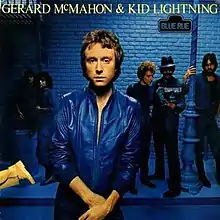Blue Rue
Blue Rue is an album by singer/songwriter Gerard McMahon and Kid Lightning. It was released on the ARC/Columbia label in January 1981 as NJC 36986 (LP) and NCT 36986 (cassette).[1] It was distributed internationally by CBS as catalog no. 84880 (LP).
| Blue Rue | |
|---|---|
 | |
| Studio album by Gerard McMahon & Kid Lightning | |
| Released | January 1981 |
| Genre | Rock |
| Label | ARC/Columbia |
| Producer | Gerard McMahon, Kid Lightning |
Background
In 1978 McMahon was chosen by Jerry Bruckheimer to provide the original songs (not the score) for the movie Defiance and when the movie was in post-production there was speculation that the project had potential for a soundtrack album.[2] When the movie premiered in February 1980 – its release was delayed to avoid possible competition with The Warriors[3] – the poster and some ads had the text “Original songs by Gerard McMahon”.[4] One of the songs McMahon wrote for the movie, “Bad Times”, was recorded by Tavares and became a minor hit peaking at number 47 on the Billboard Hot 100 and number 64 on Cashbox Top 100 Singles in late February, 1980,[5][6] and managed a peak of number 61 on the Record World Singles chart in early March.[7] McMahon also managed to get the song “Is That You” recorded by KISS for their 1980 album Unmasked. These relative successes led to a publishing deal with the newly formed Amazin’ Music run by former Billy Joel manager Irwin Mazur and, shortly thereafter, a record deal with ARC.[8]
Reception
Critical reception of the album was varied. Some saw “the most intense, exceptional album of mainstream rock of the year”, one which contained “a hot string of hits”,[9] and featured the “mostt [sic.] ambitious writing heard this year from anybody”.[10] Others called it “a blustering, hollow debut […] a formula effort that fails to find the spark to catch fire”,[11] and a syndicated review from Rolling Stone claimed that the album showcased an “utter lack of emotion”.[12] Most reviewers mentioned a stylistic debt to Bruce Springsteen and/or Tom Petty.[9][13][14] Both Billboard and Cashbox noted that the material on the album should be accessible to both Top 40 and AOR radio formats,[15][16] and critic Robert Hilburn included the album track “Town Girls” on his Alternative Top 10.[17] Despite this the album managed only minor airplay[18][19][20][21] and several radio appearances in early April, 1981, failed to improve that.[22][23] The album failed to chart on the Billboard Top 200.
Track listing
- "Taxi (Nightdriver)"
- "Night Woman"
- "Gone Tomorrow"
- "Town Girls"
- "All I Really Need"
- "You Know Me Better Than I Do"
- "Run Into Your Shadow"
- "One More Goodbye"
- "Blind Love"
- "What've You Gotta Lose"
Personnel
- Gerard McMahon – lead vocals, guitar, keyboards
- Gary Mallaber – drums, percussion, backing vocals
- John Massaro – guitar, keyboards, harmonica, backing vocals
- Al Campbell – keyboards, synthesizer
- Steve Sykes – lead guitar, guitar synthesizer
- Kenny Lewis – bass, backing vocals
Production
- Producer – Gerard McMahon, Kid Lightning
- Chief Engineer – Joel Soifer
- Engineer – Bob Deeb
References
- Billboard 1981-01-24, p. 53
- Billboard 1979-03-03, p. 19
- The Tampa Tribune of Tampa, Florida 1980-02-01, section H p. 1
- Newsday of Melville, New York 1980-03-14, section II p. 4
- Billboard 1980-02-16, p. 94
- Cashbox 1980-02-23, p. 4
- Record World 1980-03-01, p. 25
- Billboard 1980-07-05, p. 27
- The Post Star of Glen Falls, New York 1981-03-14, Featurama section p. 5
- The Muncie Star of Muncie, Indiana 1981-05-17, section B p. 9
- Argus Leader of Sioux Falls, South Dakota 1981-03-19, p. B-1
- The Record of Hackensack, New Jersey 1981-04-14, p. A-17
- Daily News of New York, New York 1981-04-20, p. 41
- Dayton Daily News of Dayton, Ohio 1981-05-17, Leisure section p. 27
- Billboard 81-01-31, p. 62
- Cashbox 81-01-31, p. 11
- The Los Angeles Times of Los Angeles, California 1981-04-26, Calendar section p. 58
- Cashbox 1981-02-21, p. 20
- Record World 1981-02-28, p. 28
- Billboard 1981-03-07, p. 28
- Radio & Records 1981-03-13, p. 46
- Radio & Records 1981-04-03, p. 42
- Radio & Records 1981-04-10, p. 40